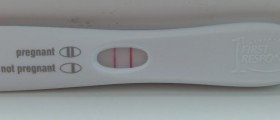Any unprotected sex can result in an STD or pregnancy.
Many people post on this forum wanting to know their chances of being pregnant. There is no way to tell other than a home pregnancy test or blood test from the doctor.
However, there are some activities that are more dangerous than others.
It is highly unlikely that you would get pregnant from:
* Dry sex ie humping with clothing on
It is unlikely but still possible that you would get pregnant from:
* Unprotected sex with no ejaculation. Pre-cum has very little if any sperm in it
* If you had unprotected sex a few days before, during or a couple of days after your period
* Ejaculation on the outside of the vagina
It is possible that you could get pregnant from:
* Unprotected sex with ejaculation
If you do have unprotected sex, you can access emergency contraception from a doctor, pharmacy or family planning clinic. This can work for up to 5 days after unprotected intercourse, but the effectiveness does decline the longer you wait so sooner is better. You can also have an IUD inserted up to seven days after unprotected sex.
Pregnancy symptoms are usually not noticed until you miss a period. You may notice cramping and tender breasts. Around 2% of women have implantation bleeding which is much lighter than a normal period. Stress can also cause delayed menstruation.
Some home pregnancy tests will show a positive result a few days before your period is due, but it is advisable to wait until the day your period is due to save you testing too early and getting a false negative ie you are actually pregnant but there is not yet enough hormone for the test to detect.
If you are sexually active and not planning to have children in the near future, it is advisable to be on some form of birth control.
For girls: There are many choices: pills, patches, shots, implants, condoms. These are all available cheap or free from a planned parenthood clinic and in most cases parental consent is not neccessary.
For guys: There are only two choices: Condoms or fatherhood - if you are ever tempted to have unprotected sex, imagine handing over a child support cheque for the next 18 years.
Condoms are the only way to protect against STI's.
Please protect yourself and save yourself and your partner the stress of an unplanned pregnancy. Hope this helps.
Loading...
Loading...
Loading...
with all do respect.. these people are just curious and wondering. I do not see the harm in that. and ANYTHING is possible.
Loading...
Can you get like birth controll to help reduce the risk of not being pregnant after you already had sex?
and can you just go get birth controll like at wal mart or at a pharmasis?
THANKS
please reply
Loading...
No sex is the safest of all though. 100%
Loading...
i just have one question. how soon would you gain weight if you were pregnant? ive gained 4 pounds and my period is supposed to start sometime this week. i pray that it does %-)
please reply
thanks
Loading...
Loading...
My sister, who was 18 at the time, and "trying" to preserve her virginity, thought that if she and her then boyfriend did not have intercourse, just touched/ rubbed on eachother with clothes off they would be okay.
Well they wer not okay. And she has a blood disorder where she CANNOT become pregnant without being on certain medications to prepare her blood first, and throughut her pregnancy. So long story short,
she became pregnant from the semen outsidethe vagina, that travelled into the vagina and up up up to the egg. She was completely intact, since they never had intercourse! So technically she lost her virginity with an abortion. BE CAREFUL GIRLS!! I just hope this experience might serve for something.
Loading...
Loading...
Sincerely
EVA
Envirenmental Lawyer
and Mother of two soon three
Loading...
Loading...
Loading...
For the person asking about the HCG test. Your doctor probably used the qualitative test just to check to see if there were any detectable levels. You can always request another test but they would probably do the qualitative to check to see if HCG is in the blood, neither test is more sensitive than the other they just measure different things. However, when I was pregnant the first time my levels of HCG rose very slowly my pregnancy was a healthy one and everything turned out fine :-) here are some more HCG facts you may find useful or just interesting:
About 85% of normal pregnancies will have the hCG level double every 48 - 72 hours. As you get further along into pregnancy and the hCG level gets higher, the time it takes to double can increase to about every 96 hours.
Caution must be used in making too much of hCG numbers. A normal pregnancy may have low hCG levels and deliver a perfectly healthy baby. The results on an ultrasound after 5 - 6 weeks gestation are much more accurate than using hCG numbers.
An hCG level of less than 5mIU/ml is considered negative for pregnancy, and anything above 25mIU/ml is considered positive for pregnancy.
hCG is measured in milli-international units per milliliter (mIU/ml).
A transvaginal ultrasound should be able to see at least a gestational sac once the hCG levels have reached between 1,000 - 2,000mIU/ml. Because levels can differentiate so much and conception dating can be wrong, a diagnosis should not be made by ultrasound findings until the level has reached at least 2,000.
A single hCG reading is not enough information for most diagnoses. When there is a question regarding the health of the pregnancy, multiple testings of hCG done a couple of days apart give a more accurate look at assessing the situation.
hCG levels should not be used to date a pregnancy since these numbers can vary so widely.
There are two common types of hCG tests. A qualitative hCG test just looks to see if hCG is present in the blood. A quantitative hCG test (or beta hCG) measures the amount of hCG actually present in the blood.
HCG guidelines during pregnancy:
3 weeks LMP: 5 - 50 mIU/ml
4 weeks LMP: 5 - 426 mIU/ml
5 weeks LMP: 18 - 7,340 mIU/ml
6 weeks LMP: 1,080 - 56,500 mIU/ml
7 - 8 weeks LMP: 7, 650 - 229,000 mIU/ml
9 - 12 weeks LMP: 25,700 - 288,000 mIU/ml
13 - 16 weeks LMP: 13,300 - 254,000 mIU/ml
17 - 24 weeks LMP: 4,060 - 165,400 mIU/ml
25 - 40 weeks LMP: 3,640 - 117,000 mIU/ml
Non-pregnant females: <5.0 mIU/ml
Postmenopausal: <9.5 mIU/ml
Levels rise differently in different women and different pregnancies so the numbers are just a guideline, more importance is placed on the change of levels than the measurment of the level itself.
:-)
Loading...
Thank You crzyfl
Thanx a lot
well as i told you its about 10 days back we had unprotected sexual intersection(that was the first night of my marrage life). and we have not yet taken any step.... now tell me dear what to do... how to stop pregnency?
please reply soon.
Loading...














